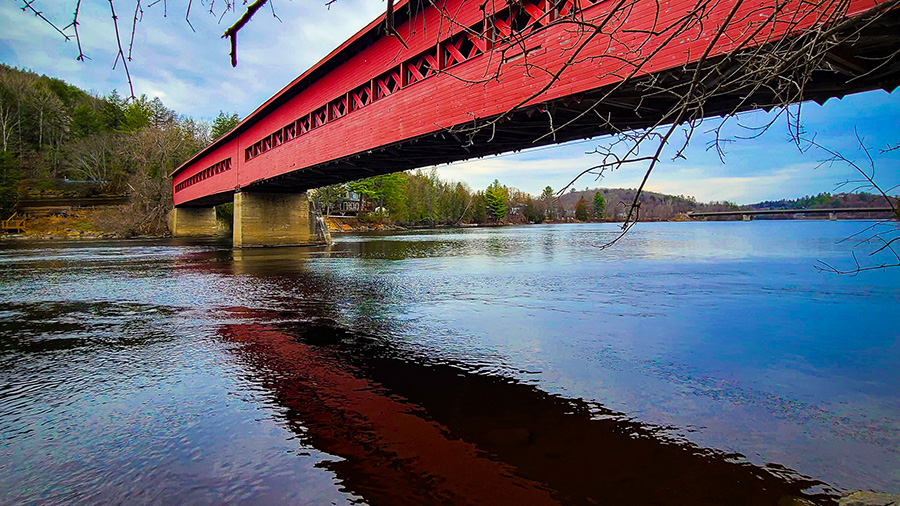I walked with my maternal grandfather, P.E. Salter, along the banks of the Gatineau River behind my grandparents’ home in Wakefield, Quebec. There were still rafts of logs coming down from places like Maniwaki and Grand Remous, and he insisted that, if I looked carefully enough, I could see the beavers building dams. I might have… But it might have been a waterlogged log. Grandad was a wise man, and I remember him always being of good humor, like when we’d all go in to Ottawa to see the changing of the guard, and eat beaver tails. So, I asked him questions, and he always did his best to answer.
It was around 1969 or 1970 and, even though I was five or six years old, I was aware, albeit faintly, of much trouble in the world. I had heard murmurs about the FLQ terrorist bombings and had probably picked up some of the anxiety of my elders. My father was a summer camp director, and often employed American draft dodgers and deserters; besides, it was not possible, in the months after Tet, My Lai, Nixon, and all the rest, to be unaware of Vietnam, or of continuing crises of racism and violence all around us. I was reading by the age of three, and I could read headlines, and I understood what Philip Forsyth and Harry Brown were saying every night on As it Happens on CBC Radio.
But all of this seemed so contradictory to the sunny experiences of my childhood, surrounded by a loving family, the primary-colored days of mid-century Canadian life, marching along with the Centennial Train to the rhythms of Bobby Gimby in the glow of Expo 67. Things did not add up, and I asked my grandfather why God allowed so much darkness in such a bright world. It was probably my first philosophical question.
P.E. never begrudged me an answer. He was a thoughtful man who loved the outdoors, his family, and poetry in equal measure. We called him “Ozymandias” because he would recite those famous lines from Percy Bysshe Shelley’s poem when my grandmother would chide him for lighting his pipe at the dining room table. He would stand imperiously and say in his booming voice:
“My name is Ozymandias, king of kings:
Look on my works, ye Mighty, and despair!”
Then, he would turn and take his pipe out to the porch. My grandmother would chuckle and say “there goes old Ozymandias again.” It was their private joke, a comedy sketch performed and reenacted countless times over many decades of marriage. I would find P.E. out in the evening, smiling smugly and enjoying his rich-smelling Balkan Sobranie. I might have suspected that he felt a kinship with Shelley because they shared the name “Percy,” but I knew that it went deeper than that.
One night, I could hear hear the nightjars far above, zeroing in on summer insects, but I couldn’t see them. That brought Shelley’s “To a Skylark” to P.E.’s thoughts; he recited it in measured tones, drawing out the syllables to a gentle quiet in the night:
Hail to thee, blithe Spirit!
Bird thou never wert,
That from Heaven, or near it,
Pourest thy full heart
In profuse strains of unpremeditated art.
The unseen songbird of Shelley’s poem is privy to eternal wisdom, “things more true and deep than we mortals dream,” and is not blind to suffering and pain but, as P.E. would note, it can still sing an ecstatic song because it is not burdened by the worst of human impulses.
Yet if we could scorn
Hate, and pride, and fear;
If we were things born
Not to shed a tear,
I know not how thy joy we ever should come near.
If only we could overcome the basest impulses of humanity, maybe then we still might only approach the transcendent joy of the skylark’s song.
I don’t believe that P.E. ever deluded himself about the pain and darkness that existed in the world. I remember him shaking his head sadly as he read the news of the Vietnam war and the escalation of the American bombing campaign in the pages of the Ottawa Citizen; I saw his eyes mist over on one autumn visit that coincided with Remembrance Day. We passed by the Cenotaph in Ottawa’s Confederation Square, and my grandfather stopped and stood at attention for a moment. “They were all so young,” I heard him whisper. “Too young.”
P.E. was a profoundly sensitive man who, then in his 70s, had lived through and seen the darkest times of the 20th century, and that had touched him deeply. So on that walk by the river, looking out at the flowing water and the traffic it carried, he stopped, lifted his pipe to his lips, and thought for a long while. “People create pain,” he said after a moment. “And that’s why it’s our job to fix things, and soothe the pain that we have created.”
He then pointed out a beaver – or so he said – and we walked on, watching the rafts of logs float down the Gatineau toward Ottawa.
***
Image: The covered bridge across the Gatineau River in Wakefield, Quebec.

